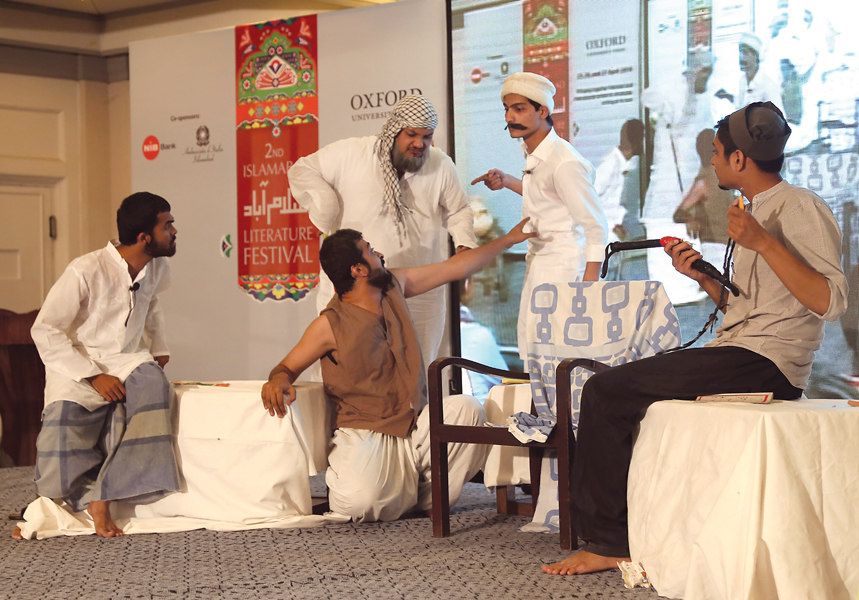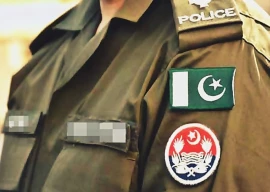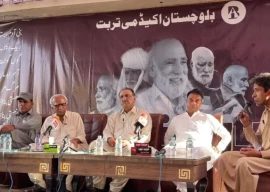
The 2nd Islamabad Literature Festival (ILF) concluded on Sunday after breaking through the capital’s stony political demeanour with an extravaganza of creative and literary activities that included book launches, discussions, art exhibitions and theatre performances.
From ardent readers snapping photos with their favourite writers to a jam-packed sessions on Manto and Jalib to discovering new trends in writing and publishing, the three-day festival organised by the Oxford University Press (OUP) offered a celebration of books, their authors and readers.
Despite hiccups in management, some cancellations and some revisions in the printed schedule, the ILF, which was first held in 2013, attracted hundreds of literature enthusiasts from the twin cities and beyond.
The 2014 edition of the ILF was bigger in some respects. It had over 120 speakers and almost twice the number of sessions than 2013. But perhaps due to the hot weather, the number of participants did not go up reciprocally.
Still, people thronged the book stalls in the parking lot and the five session venues inside the building to listen to some-exciting-some-plain discussions.
Sunday started with a session on the ownership of language moderated by Muneeza Shamsie, and as it progressed, the changing scenario of Urdu literature and language as well as the art of translations also came under discussion during different sessions.
Indian writer Shobhaa De was the foreign star of the festival with book signings and participation in multiple sessions while Meenu Gaur and Farjad Nabi, stars of Pakistani film industry, were in conversation with social activist Samar Minallah about their film Zinda Bhaag.
While Syed Nomanul Haq and Rahat Kazmi discussed the poetry of Ghalib in the hotel’s Central Lawn, Kishwar Naheed discussed harassment of women at the workplace and Aasim Sajjad Akhtar talked about the structural, religious and caste relations in Pakistani society spelling misery for women.
The festival concluded with a performance by the young artists of the National Academy of Performing Arts (NAPA) who presented the play “Taleem-e-Balighaan.” The essence of the play was to eliminate all the differences among each other and work together for progress and prosperity of the country.
OUP Managing Director Ameena Saiyid said the festival was not a celebration of writers and books alone but also of the habit of reading.
The festival also included political sessions such as on the future of Afghanistan, in which speakers expressed the hope that Afghanistan will not be used as a buffer zone against other countries.
Some sessions took upon political tones even though they were meant to be literary. In a session about Azfar Kamal’s memoirs, former foreign secretary Riaz Khokhar talked at length about lack of leadership and the potential for economic cooperation among the Asian countries.
Italian art critic Lavinia Fillipi and Pakistani artist Quddus Mirza discussed the Arte Povera movement which depicts everyday life.
Art was an interesting addition to the festival with MyArtWorld and ArtNow supporting the arts-based sessions and all-day art exhibits. The Citizens Archive of Pakistan also organised an exhibition of vintage Pakistani advertisements.
Some panellists who spoke about art at the festival lamented the lack of public support for arts and the absence of a vibrant museum culture.
Poetry selections from Parveen Shakir and short story selections from Manto and Ghulam Abbas were launched on the last day.
Published in The Express Tribune, April 28th, 2014.

















COMMENTS
Comments are moderated and generally will be posted if they are on-topic and not abusive.
For more information, please see our Comments FAQ